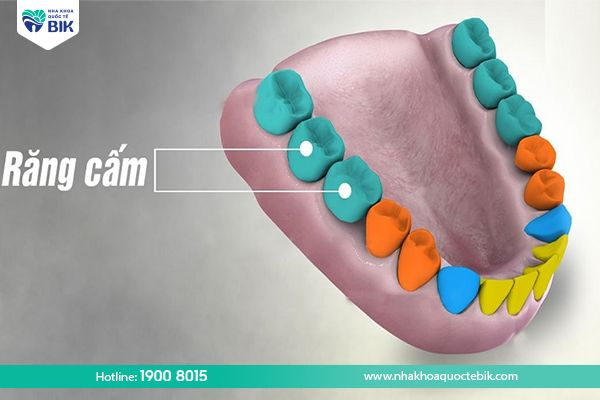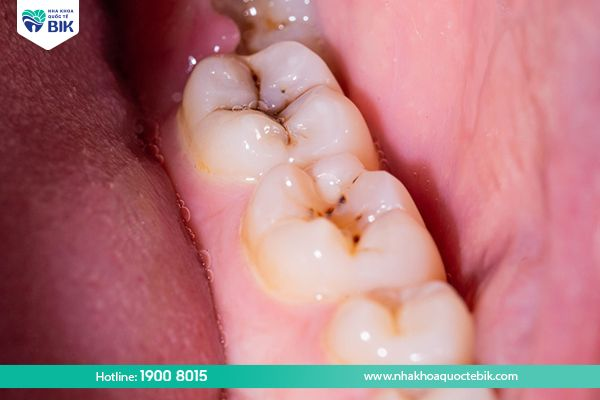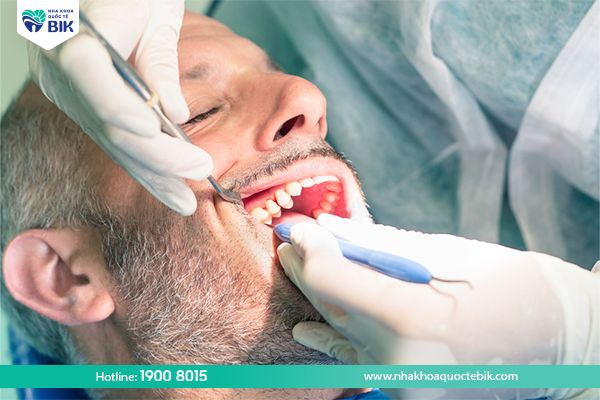Tooth decay is an oral disease that can occur at any age and any tooth on the jaw can be decayed. However, if you pay attention, the molars are the teeth with the highest risk of decay for many reasons. Although the principle of treatment is always to preserve the real teeth as much as possible, in some cases the doctor will still prescribe the extraction of decayed teeth. Let’s find out with BIK International Dental Clinic whether extracting decayed molars has any effect in the article below.
1. What are molars?
Many people confuse molars with wisdom teeth because they are both in the jaw teeth group. However, molars are teeth number 6 and number 7 from the incisor position, so each adult will have about 8 molars divided equally between the upper and lower jaws, each jaw has 4 teeth.
The characteristics of molars are that they usually have a wide chewing surface, a large body and are responsible for the main function of chewing and crushing food. This type of tooth usually grows permanently between the ages of 6 and 8 and will not be replaced. Therefore, if for some reason this tooth is lost, it will never grow back. That is also the reason why they are called molars.
Similar to the structure of other teeth on the jaw, molars include 3 parts: the tooth body, the tooth neck, the tooth root and a set of 3 layers: enamel, dentin and the innermost layer is the tooth pulp. Normally, the upper molar will have 2 roots, the lower molar will have 3 roots. However, in some rare cases, molars also have more or less than 1 to 2 roots.

2. Causes of molar decay
Teeth in any position on the jaw are susceptible to tooth decay, but teeth located in the back are difficult to clean, so the risk is also higher. Understanding the causes of tooth decay is a way to help people reduce their worries as well as find the most suitable treatment method.
2.1. Improper oral hygiene
The position of molars is easily stuck with leftover food, so if not cleaned thoroughly, it will create conditions for bacteria to grow, develop and attack the teeth. Moreover, molars are located deep in the jaw, so if you do not clean your teeth regularly or do not clean them thoroughly, you will not be able to completely remove disease-causing bacteria and plaque on your teeth. As a result, molars are easily susceptible to cavities.

2.2. Poor tooth shape
The shape of molars is not as good as other teeth because the chewing surface is quite wide, with many pits and grooves. These pits and grooves are deep, making it easy for food to get stuck, creating a favorable environment for bacteria to grow and attack the teeth. Along with that, molars also take on the main chewing function, so they are also very susceptible to food debris and tooth decay.
2.3. Unreasonable diet
In addition to causes such as tooth shape and improper oral hygiene habits, diet is also a factor that affects the health of teeth.
If the patient has the habit of eating foods containing a lot of sugar, starch, and high acid content, it will also affect the teeth. Sugar has a high adhesiveness, so if it is not cleaned properly, the possibility of tooth decay will be very high. Therefore, it is necessary to limit the consumption of cakes, candies, carbonated soft drinks, etc. They will weaken your tooth enamel, leading to tooth decay.

2.4. Effects of other diseases
According to recent dental studies, patients with gastroesophageal reflux are at higher risk of tooth decay than normal people. In addition, if the gums recede or the mouth is dry, reduced saliva secretion will also create conditions for bacteria to grow, leading to tooth decay as well as other oral diseases.
3. Symptoms of molar decay
As mentioned above, due to the structure and position, molars are at much higher risk of decay than normal teeth. In the case of molars with cavities, a common symptom may appear as follows:
– When eating or cleaning teeth, if you strongly impact the tooth, you will feel a sharp pain. If the decay has become severe, even when the tooth stops working, you will still feel pain in the inner jaw. This is a sign that the molars have very severe cavities.
– On the surface of the tooth, there are round black holes that can be easily observed with the naked eye. In the case of tooth decay, the holes on the tooth surface will be larger and there will be a phenomenon of bulging gum tissue.
– When eating or drinking foods or drinks that are too hot or cold, the teeth will feel sensitive and painful.
– Molars with cavities cause inflammation of the gums, prolonged toothaches spread to the nerves in the head, the patient may have a high fever.
– The gum tissue is swollen, bleeding at the base of the tooth around the cavity. This condition, if prolonged, causes bad breath and a slightly bitter taste on the tongue.

4. Why should decayed molars be extracted?
Molars have a very important position, they are related to the nerves as well as the roots grow deeply, making it difficult to extract. However, if decayed molars are not treated promptly, they will affect oral health as well as overall health:
4.1. Causes insomnia
The pain caused by molars is often very severe and painful, affecting the patient’s sleep, so the condition of not getting enough sleep will often occur. If insomnia lasts for a long time, it can affect mental health and cause physical weakness.

4.2. Affects the digestive system
Because molars play the main role in chewing, when they are in pain, it will greatly affect the chewing and grinding of food. As a result, patients may stop eating, lose their appetite, or not chew properly, leading to the stomach and digestive system being affected. Along with that, constantly skipping meals causes the body to not be provided with enough necessary nutrients, making the patient tired, weak, and malnourished.

4.3. Causes oral health to decline
If molar decay is not treated promptly, it will leave many dangerous complications. When harmful bacteria attack and slowly eat deep into the tooth, the level of damage they cause to the tooth is extremely large.
Bacteria will continue to eat away, constantly attacking the soft pulp and spreading to the jawbone, gums and surrounding gums. When attacking the area where many nerves are concentrated, they will cause direct damage, not only stopping at severe pain but also affecting the health of the whole body.
5. Does extracting a decayed molar have any effect?
In cases where the molar is too severely decayed, affecting the pulp and causing the tooth to loosen, dentists are forced to extract the tooth so as not to affect the alveolar bone and healthy teeth next to it. The tooth after extraction will be sutured with absorbable sutures and after a week, the extraction wound will heal and you can eat and chew normally.
After extraction, it is necessary to implant a denture early to ensure aesthetics, bite function as well as limit bone loss.

6. Notes after extracting molars
Because molars have the important function of chewing and grinding food, after extraction, patients should eat porridge or soup in the first period. In addition, patients should also prioritize using soft foods that are easily crushed by teeth such as jelly, salmon, milk, yogurt, etc. to reduce tooth activity.
In the period after extraction, the patient’s body will lack essential nutrients, so they need to be supplemented promptly. In order to increase resistance, vegetables containing lots of vitamins and fiber will be very effective. In case you have to chew, you should use the jaw that does not have the extracted tooth.
During this time, you should also avoid eating foods that are too hard, as well as spicy, hot, cold foods or stimulants. To temporarily relieve pain, you can apply some pain relief methods at home such as applying ice.

Through the above article, hopefully you have clearly understood whether extracting a decayed molar has any effects and what to note after extracting molars to ensure safety. To avoid having to remove decayed molars, you should go to a reputable dental clinic for treatment and to prevent tooth decay from developing when detecting signs of tooth decay in the early stages.


















